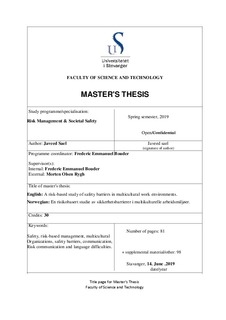A risk-based study of safety barriers in multicultural work environments
Master thesis
Permanent lenke
http://hdl.handle.net/11250/2628711Utgivelsesdato
2019-06-14Metadata
Vis full innførselSamlinger
- Studentoppgaver (TN-IEP) [336]
Sammendrag
11 of 13 studies show that foreign employees are about 1,6 to 13 times more often injured in occupational accidents compared to Norwegian employees. Even though, both national and non-national employees are involved in occupational accidents, the risk for the foreign employees is 46 % higher compared to Norwegian employees. Thus, the main purpose of this case study is to investigate safety barriers in multicultural/multilingual (MCML) land-based oil and gas organizations, and “How could a risk-based approach be used to overcome safety barriers in multicultural organizations?” Furthermore, this study will describe how to reduce the disparities between Norwegian and foreign employees by utilizing a risk-based model.
This is a field-based qualitative case study including 7 weeks of participatory field observations within the organization, 17 face-to-face interviews with employees on every level and different backgrounds, as well as with 5 representatives from 5 different companies, and 4 open-ended interviews with experts (authoritativeemployees) within the field of occupational safety. Although, there were not many relevant documents in the field to study, this dissertation has systematically looked and analysed what was gathered from the relevant documents and previous studies throughout the paper.
Despite the focus on safety and “The Zero Vision” in organizations, respondents agree that the current approach to achieve safety in MCML context is not good enough to prevent accidents. It is because the current approach does not account for MCML aspects of production. Through this exploratory case study some of the most important barriers in MCML context have been highlighted, that are often not visible or overlooked by the organizations, but they do exist at all times and have a significant influence on safety and increase disparities between different groups, for example, language and communication barriers, fear of job loss, discrimination and cultural disparities and etc.
The purpose of results and recommendations in this paper is to raise awareness and understanding among key stakeholders about the importance of the MCML aspects of the society and its advantages to integrate and maintain safety in diverse industrial operations and to strive to strengthen standards for better future development. Language is the key to all the challenges related to MCML societies and must be studied in different contexts to highlight other challenges in MCML societies such as, poverty among foreigners, class distinctions, increasing crime and labour crime rate, racism, discrimination, social dumping and insufficient integration.
Beskrivelse
Master's thesis in Risk Management and Societal Safety
